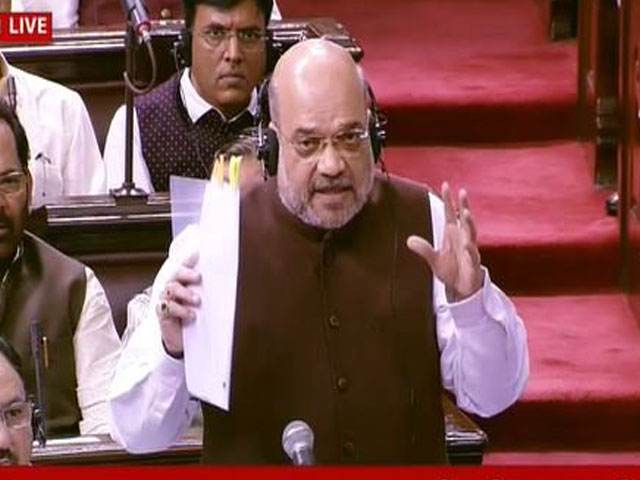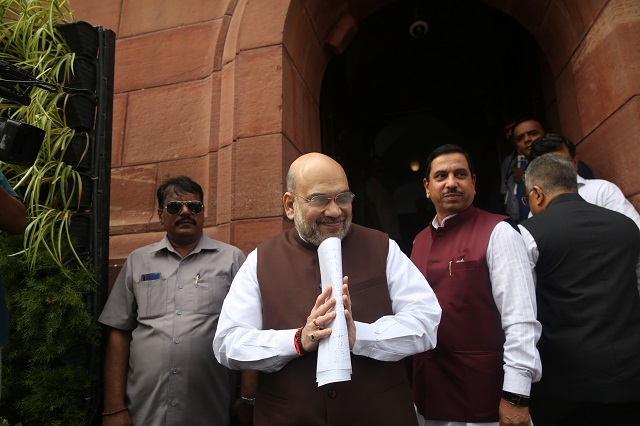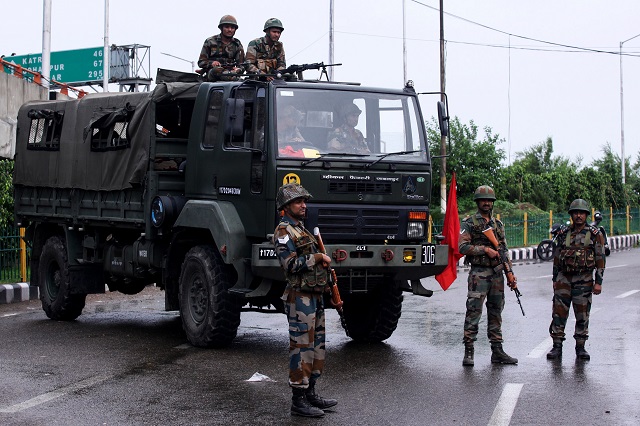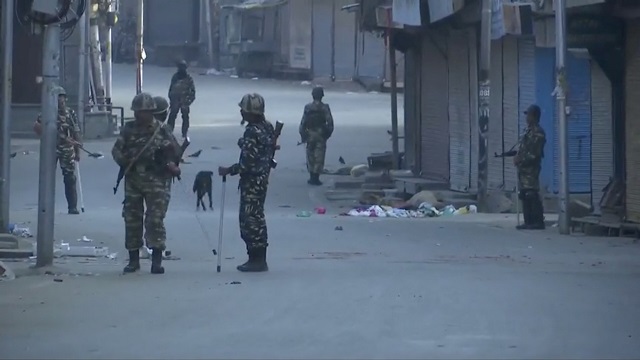
Home Minister Amit Shah told parliament that the president had signed a decree abolishing Article 370 of the constitution giving special autonomy to the Muslim-majority Himalayan region.
Occupied Kashmir and Ladakh will now be Union Territory with a legislature, said Indian media.
HM Amit Shah: Jammu and Kashmir to be a union territory with legislature and Ladakh to be union territory without legislature pic.twitter.com/nsEL5Lr15h
— ANI (@ANI) August 5, 2019
“The entire constitution will be applicable to Jammu and Kashmir state,” Shah said, ending the occupied territory's rights to make its own laws.
 India's Home Minister Amit Shah greets the media upon his arrival at the parliament in New Delhi. -Reuters
India's Home Minister Amit Shah greets the media upon his arrival at the parliament in New Delhi. -ReutersThe step would also mean revocation of a bar on property purchases by people from outside the state. Such plans have in the past provoked warnings of a backlash in Kashmir.
The law had also reserved state government jobs for residents, as well as college places, in an effort to keep the state from being overrun by people from the rest of India.
Following the revocation of Article 370, the Indian Army and Indian Air Force have been put on high alert.
Prime Minister Narendra Modi’s right-wing ruling party had pushed for an end to Kashmir’s special constitutional status, arguing that such laws had hindered its integration with the rest of India.
Earlier during the parliament session, Shah had urged members of parliament to discuss the legislation that seeks to end the autonomous status for Muslim-majority Kashmir..
"It is a wrong notion that Kashmir is with India because of Article 370 and not because of the letter of accession signed in 1947. No step has been taken in the past because of vote bank politics, but we are not bothered about the vote bank. We should not waste even a second to remove Article 370. We are ready for debate and voting on this issue. Let the House debate," said Shah.
Shah, who is also the president of India's ruling Bharatiya Janata Party (BJP), made the announcement during an address at the Rajya Sabha (the upper house of the Indian parliament) which caused a ruckus. Indian Prime Minister Modi was also in attendance.
Unprecedented lockdown
Earlier, Modi held a security cabinet meeting, hours after his government ordered a lockdown in occupied Kashmir, cutting phone and internet links and putting local politicians under house arrest.
New Delhi has claimed the sweeping clampdown, enforced by tens of thousands of military reinforcements, was needed because of the "prevailing law and order situation".
All phones, internet services and cable networks were snapped at midnight in the region of more than seven million people following days of soaring tensions.
Only residents with a "curfew pass" were allowed on the streets.
NDTV, one of the rare broadcasters able to transmit from the main city Srinagar, showed empty streets dominated by security forces.
 Indian occupying forces on alert in the region. -AFP
Indian occupying forces on alert in the region. -AFPAhead of the clampdown, India ordered thousands of tourists out of occupied Kashmir saying there was a threat of militant attacks.
Thousands of paramilitary forces and riot police moved in around midnight, blocking roads with barbed wire and placing steel barricades across roads in several parts of Srinagar.
Modi's Hindu nationalist government has said that changes to the constitutionally guaranteed job and property privileges for Kashmiris were needed to end the conflict.
It put Kashmir under direct rule from New Delhi last year after Modi's Bharatiya Janata Party ended a coalition with a local party in the state assembly.
 Indian security personnel patrol a street in Srinagar. -Reuters
Indian security personnel patrol a street in Srinagar. -ReutersNearly 80,000 paramilitary forces have been flown into Kashmir in past 10 days, already the world's most militarised region where India has roughly 500,000 troops.
The security measures have sparked panic among residents, who formed long queues outside petrol stations, food stores and cash machines.


1725443747-0/Untitled-design-(5)1725443747-0-165x106.webp)




1731738952-0/Untitled-design-(13)1731738952-0-270x192.webp)
1731735822-0/Copy-of-Untitled-(1)1731735822-0-270x192.webp)


1731669127-0/diddy-(44)1731669127-0-270x192.webp)




1731647129-0/Untitled-design-(56)1731647129-0-270x192.webp)






COMMENTS (1)
Comments are moderated and generally will be posted if they are on-topic and not abusive.
For more information, please see our Comments FAQ